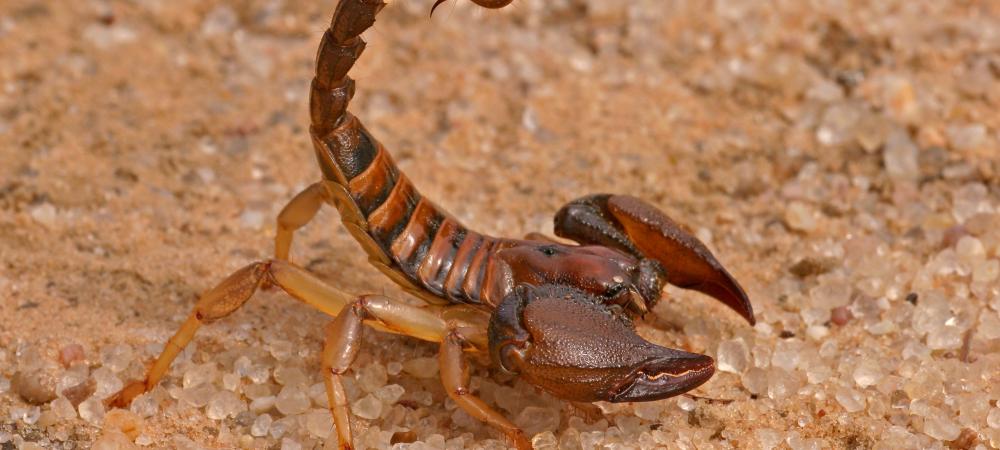Are There Scorpions in Texas?

If you're a homeowner in Texas, you might be wondering: Are there scorpions in Texas? The short answer is yes—scorpions are native to the state and can be found in various parts of Texas. Understanding where scorpions live and how to protect your home from them is key to keeping your family safe. This guide will walk you through everything you need to know about scorpions in Texas, including the most common types, where they're found, and how to safeguard your home from them.
What to Know About Scorpions in Texas
Texas is home to a wide variety of scorpion species—18 in total. While most are harmless, some can pose a threat to your health, particularly to young children or individuals with allergic reactions. Knowing which species to watch for can help you prepare and take the proper precautions.
Where Are Scorpions Found in Texas?
Scorpions thrive in warmer, drier climates, so it's no surprise that Texas, with its hot temperatures and diverse geography, is a prime location for these arachnids. Some areas of Texas, such as West Texas and South Texas, are especially populated by scorpions, but they can be found throughout the state.
Commonly affected regions include:
- West Texas – Areas like El Paso, Midland, and Odessa are home to scorpions, especially in the desert-like conditions ideal for species like the Giant Desert Hairy Scorpion.
- South Texas – Cities like McAllen, San Antonio, and Laredo have a warmer, more humid climate, making them attractive to scorpions such as the Striped Bark Scorpion.
- Central Texas – Urban and rural areas in Austin and San Antonio can host species like the Texas Brown Scorpion, especially in rocky or suburban environments.
- North Texas – While less common, scorpions like the Texas Brown Scorpion can still be found in rural areas around Dallas and Fort Worth.
- Hill Country – Known for rocky terrain, this area is ideal for scorpions, particularly the Texas Brown Scorpion.
- East Texas (Piney Woods) – Scorpions are less abundant in the humid forests but can still be found, especially the Striped Bark Scorpion.
- Coastal Texas – In areas like Houston and Corpus Christi, scorpions are less common but still present, often seeking shelter in dry, sheltered spots.
Scorpions thrive in dry, hot regions like West and South Texas but can also be found in more humid areas like East and Coastal Texas. Homeowners should be vigilant no matter where they live.
Most Common Types of Scorpions in Texas
Several species of scorpions call Texas home. Some are relatively harmless, while others can deliver more painful or venomous stings. Here's a deeper dive into the most common types of scorpions you might encounter in Texas:
- The Texas Brown Scorpion (Centruroides vittatus), also known as the Striped Scorpion, is the most common species in Texas. It is mildly venomous—its sting is painful but typically not dangerous to humans unless there is an allergic reaction.
- The Striped Bark Scorpion (Centruroides Sculpturatus) is another common species in Texas, especially in the more populated urban areas of Central and South Texas. This scorpion is dangerous—its sting can cause intense pain and, in rare cases, more severe symptoms. Children and those with allergies may experience serious reactions.
- The Giant Desert Hairy Scorpion (Hadrurus arizonensis) is the largest scorpion species in Texas, capable of growing up to 7 inches in length. It is mildly venomous—while intimidating in size, its sting is generally harmless to humans, causing only temporary pain and swelling.
- Though not as widespread as other species, the Arizona Bark Scorpion (Centruroides exilicauda) can be found in parts of West Texas, especially in areas near the Arizona border. This scorpion is the most dangerous in texas—its venomous sting that can cause severe pain and even life-threatening symptoms, especially in young children and elderly adults.
- The Tesselated Scorpion (Paruroctonus boreus) is found mostly in the western regions of Texas, including the Permian Basin. This scorpion is mildly venomous—its sting is generally not harmful, causing only mild pain or discomfort.
How Do Scorpions Enter Your Home?
Scorpions are adept at finding their way indoors, especially during hot weather when they seek shelter from the heat. They may enter through cracks in doors, windows, or walls. Even the smallest of openings can be enough for scorpions to slip through.
Once inside, they typically seek out cool, dark areas such as basements, attics, closets, or underneath furniture. Scorpions may also hitch a ride on items like boxes, bags, or even pets that have been outside. Learn. more about why scorpions come indoors in our blog on what attracts scorpions to homes.
How to Protect Your Home from Scorpions
- Seal Entry Points: Scorpions can fit through even the smallest cracks and gaps. Inspect doors, windows, and walls for any openings and seal them with weatherstripping or caulk. Don’t forget to check around utility lines and pipes where scorpions may enter.
- Declutter Your Home: Scorpions prefer dark, cluttered areas where they can hide. Keep your home tidy, especially in basements, garages, and attics. Store items in sealed containers instead of cardboard boxes, which scorpions can easily hide inside.
- Trim Landscaping: Keep bushes, shrubs, and trees trimmed and away from the exterior of your home. Scorpions are attracted to these areas, where they can hide. Consider placing a barrier of gravel or rocks around your home’s foundation to prevent scorpions from hiding near your house.
- Remove Debris: Scorpions love to hide under piles of wood, rocks, and leaves. Keep your yard clean and remove any debris that may provide shelter for scorpions. Store firewood away from the home, preferably off the ground.
- Use Pest Control Services: If you're dealing with a scorpion problem, a professional pest control service can help. They can treat the perimeter of your home and address any areas where scorpions may be hiding. Regular pest control can also help keep scorpions and other pests from entering your home.
What Should You Do If You Encounter a Scorpion?
If you encounter a scorpion inside your home, it’s important to remain calm. Most species of scorpions in Texas are not deadly, but they can still sting, and their venom can cause pain or allergic reactions.
Here’s what to do:
- Capture the Scorpion: If you can safely do so, use a jar or container to capture the scorpion. This will help pest control experts identify the species and determine the best course of action.
- Treat a Sting: If you or someone in your household is stung, wash the area with soap and water. Apply ice to reduce swelling, and take over-the-counter pain relief if necessary. For more severe reactions, including difficulty breathing or extreme pain, seek medical attention immediately.
- Call a Professional: If scorpions are a recurring issue or if you're unsure about the best way to deal with them, it’s always a good idea to contact a pest control professional like Justice Pest Services. Our team can assess your home, identify potential entry points, and offer treatments to keep scorpions away. If you’re local to Central Texas, contact our exterminators today.
Protecting Your Home from Texas Scorpions
Scorpions are a part of Texas’ unique natural environment, and while most are not dangerous, their presence in and around your home can be unsettling. By understanding the types of scorpions common in your area and taking steps to protect your home, you can minimize the risk of encountering one. If you’re unsure how to deal with scorpions or have a recurring issue, don’t hesitate to reach out to a local pest control expert who can help ensure your home remains scorpion-free.
Stay safe and scorpion-free with these preventive measures, and remember, Justice Pest Services is just a call away if you need it!
